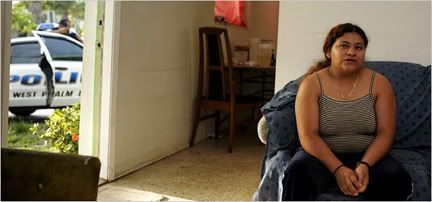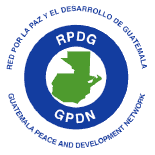:: Here Illegally, Guatemalans Are Prime Targets of Crime :::
By RIKI ALTMAN and TERRY AGUAYO
Published: August 27, 2006
http://www.nytimes.com/2006/08/27/us/27guatemala.html?ex=1157256000&en=c131c8ca1aa6f92a&ei=5070&emc=eta1

WEST PALM BEACH, Fla., Aug. 21 — It took Esteban Velásquez a year to save enough money to buy a gold chain he had always wanted. But last summer, as Mr. Velásquez, an illegal immigrant from Guatemala, walked to a convenience store with a friend, a man punched him in the face and ran off with the $400 piece of jewelry.
Robberies of illegal immigrants have become a serious problem here in recent years, and the victims, mostly from Guatemala, often avoid reporting the crimes, fearing deportation.
“I was afraid,” said Mr. Velásquez, 25, a landscaper who arrived here six years ago.
He reported the crime but later tried to hide from the authorities to avoid appearing in court. “But then I thought, whether I’m documented or not, I still have my rights,” he said.
With such crimes on the rise — they are common enough to have a chilling street name, “Guat-bashing” — the Guatemalan-Maya Center in Lake Worth, Fla., and the Guatemalan Consulate in Miami, along with local law enforcement agencies, religious groups and banks, are working to help illegal immigrants from Guatemala protect themselves.
Predators know that Guatemalans often carry cash in their shoes or underwear because they do not trust banks, police officials said, and that if they are in the United States illegally, they often lack the documentation needed to open accounts. They are frequently attacked on Friday nights, the police said, after they have cashed their paychecks.
“They’re being preyed upon because they’re easy victims,” said Capt. Mary Olsen of the West Palm Beach Police Department. “They don’t fight back. They’re very modest people, and they’re afraid of the police.”
In February, the department assigned Freddy Naranjo, a police officer from Ecuador, as a liaison between the police and the immigrant community. He has become a familiar face in neighborhoods with high rates of crimes against illegal immigrants.
“The hardest part was trying to work with their trust,” Mr. Naranjo said. “They didn’t trust the Police Department. The major thing is to come out and report these crimes, not hold back.”
Another law enforcement official said that it was the responsibility of the federal government, not the local police, to round up illegal immigrants, and that local officials would report them only if they were charged with a crime.
Between January and early August, Captain Olsen recorded 15 arrests involving robberies of Guatemalans in West Palm Beach. Fernando Alvarez, a community relations supervisor for the Palm Beach County Sheriff’s Office, estimated that more than 50 robberies of Guatemalans had been reported in unincorporated parts of the county this year.
The figures probably do not reflect the actual number of attacks, law enforcement officials said, since few illegal immigrants report the crimes.
Some victims have lost more than money in the attacks. In February, two men shot and killed Osmar Bernardo, 26, who was walking home from a convenience store in West Palm Beach. In December 2005, Eben Roblero, 21, was gunned down while repairing his car in an alley behind an apartment complex. Both of the victims were Guatemalans.
Even law enforcement officials have been accused of victimizing immigrants. In recent years, a West Palm Beach police officer and a county sheriff’s officer were arrested on charges of stealing money from immigrant farmworkers.
Immigrants from other Latin American and Caribbean countries, including Honduras, Nicaragua, Haiti, El Salvador and Mexico, are also frequent targets in Palm Beach and neighboring counties.
Rosa Bardales, an illegal immigrant from Honduras, hesitated last year before reporting a break-in at the two-bedroom duplex she shares with her husband, baby daughter and two other people.
“I thought I could be deported and separated from my daughter,” Ms. Bardales said. “I couldn’t begin to imagine what that would be like. But I left it to God.”
Ms. Bardales, who makes $180 a week working on a construction cleanup crew, was robbed of $300 in the break-in.
According to Census Bureau figures from 2005, Palm Beach County’s population of 1.2 million people includes 18,002 Guatemalans, 37,377 Mexicans, 7,745 Hondurans, 2,386 Nicaraguans and 3,013 Salvadorans. Many are migrant farmworkers.
Benito Gaspar, a supervisor for the Guatemalan-Maya Center, said the actual immigrant population was probably three to four times as large as that because the census figures did not include many of the illegal immigrants.
Mr. Alvarez said the sheriff’s office had organized forums with other organizations in West Palm Beach and Lake Worth where Guatemalans could register for identification cards and passports from the Guatemalan Consulate. The program started in 1998 but has gained momentum recently, he said.
To get an ID card from the consulate, immigrants must present a birth certificate or a proof-of-residency card from Guatemala, said Beatriz Illescas, the country’s consul general in Miami. The cards make it easier for illegal immigrants to get jobs, rent apartments and open bank accounts.
Diane Wagner, a spokeswoman for Bank of America, said that in 2004 her company began accepting Guatemalan passports and ID cards issued by the consulate as forms of identification needed to open a savings or checking account.
And like the police in West Palm Beach, the county sheriff’s office is increasing its presence in immigrant neighborhoods, giving lectures, attending church and even hanging out in convenience stores and Laundromats to spread the word that the police can be trusted.
“We want them to have a better place to stay,” Mr. Alvarez said. “We’re not immigration.”
Outside his uncle’s modest rented home in West Palm Beach, Mr. Velásquez said he avoided going outside and remained stunned that someone would grab one of his few valuable possessions.
“We come here to work and we work very hard for little money,” he said. “That’s why I felt so sad when I lost my chain. Who knows how long it will take me to save for another one?”
...

